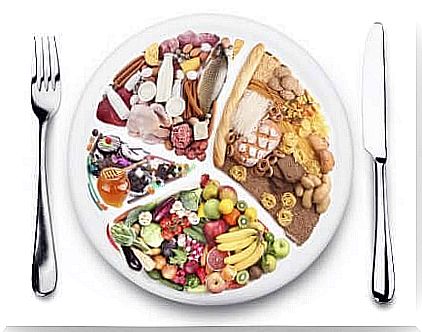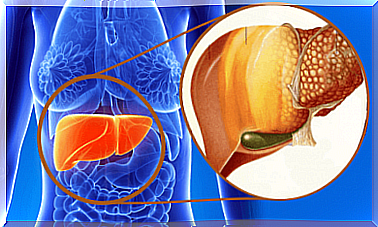Preventing Digestive Problems: 9 Healthy Habits
Eating should always be a pleasure, but certain habits can cause digestive problems. Most of the time, however, it is very easy to change these practices. We have some recommendations for you.

Indigestion is a common problem. Flatulence, constipation, heartburn, bloating and other unpleasant ailments can occur at any time. We often think that eating healthy food is enough to prevent digestive problems, but there are other factors that play a fundamental role as well.
Digestive disorders are not only uncomfortable, they can also lead to further complications and illnesses in the long term.
But simple changes in everyday life are often very effective. Eating habits and lifestyle have a significant influence on digestion and can prevent discomfort.
Healthy habits to avoid indigestion
1. Adequate fluids

The famous 8 glasses (or 2 liters) of water a day are of great importance for the health of the stomach. Numerous studies show that it can prevent constipation. The intestine needs fluid to carry the bolus of food.
In addition, water facilitates the breakdown of food and the absorption of nutrients. Without fluids, we lose much of the benefits of what we eat.
We can’t just ingest fluids through drinks. Fruit and vegetables also contain water. Freshly made juices, soups and teas are also excellent alternatives for absorbing fluids. However, you should avoid commercial soft drinks and beverages containing caffeine.
2. Eat only as much as you need
Eating more doesn’t mean eating better. Too much of a good thing leads to an uncomfortable feeling of fullness, indigestion and many other problems.
When you eat large amounts, the body has to put in extra effort to process the excess food. It produces more digestive enzymes to break down food and this in turn forces the body to produce more stomach acid. As a result, the risk of heartburn is greater.
Overeating also causes gas and metabolism to accelerate, which can lead to exhaustion, sweating and a feeling of heat.
3. Balanced diet to prevent indigestion

The food should include vegetables, proteins, and healthy carbohydrates. Dr. Gonzalo Guerra, an expert at the Medical-Surgical Center for Digestive Diseases in Colombia, recommends minimizing fat consumption. He recommends lean meat such as turkey, chicken or rabbit as a source of protein.
Manufactured products often contain trans fats, which are associated with cardiovascular and digestive ailments, such as gastric ulcers, colitis and an irritable digestive system.
These products also contain additives that studies have shown can lead to leaky gut. This, in turn, can lead to inflammation, headaches, and food allergies.
However, omega-3 fatty acids, which promote stomach health, are very healthy . Not only do they satisfy hunger, but they also reduce the need to overeat. On the other hand, they also facilitate the absorption of nutrients. Studies suggest that these fatty acids relieve inflammation and stomach ulcers.
4. Get fiber through your diet
Foods with fiber have various properties that are particularly beneficial for intestinal health and digestion. Fiber cleans the digestive tract and ensures healthy stool volume, which at the same time prevents constipation.
For this reason, you should include dried fruits, legumes, vegetables, cereals, and fruits in your diet.
5. Control stress to take precaution against indigestion

The digestive system is closely connected to the brain: over 100 million nerve cells transmit information in both directions. That is why we have “butterflies in our stomach” and we have to “digest” problems first. Most of the time, feelings take place in the stomach.
Stress also affects gastrointestinal health, which has been shown by numerous studies. This can lead to diarrhea, constipation, heartburn or gastritis, for example. Various techniques help control stress. For example, meditation, yoga or other methods are recommended to maintain mental and digestive health.
6. Respect the food and take it slowly
Meal time should be respected. Avoid distractions like watching TV or work that are just stressful, even if you think they are relaxing. Eating quickly can also cause gas or other digestive problems. Studies show that mindfulness while eating helps improve digestion and stomach health.
You should also take the time to chew the food you eat well. Because digestion begins and you can relieve the stomach. Chewing thoroughly makes the digestive enzymes easier to do their job!
In addition, it creates more saliva, which promotes the breakdown of carbohydrates and fats. At the same time, it moisturizes solid food, which can then be better transported through the digestive tract. So take enough time to make the digestive process easier.
7. Make a nutrition plan to avoid stomach discomfort

Not all foods have the same effects on everyone. Some people suffer from intolerance or allergies to certain foods and therefore have digestive problems. If you keep a journal of your eating habits, you can find out when your body reacts negatively and which foods are causing discomfort.
8. Exercise against indigestion
It has been shown that sporting activities support digestive tract health. Exercise and exercise can reduce the time it takes for the bolus of food to transit through the digestive system by up to 30 percent. It also improves the absorption of nutrients, relieves constipation and reduces intestinal inflammation.
9. Avoid harmful stimulants

Habits like smoking and drinking alcohol lead to numerous digestive problems. Tobacco increases the risk of heartburn, stomach ulcers and, in the worst case, it can also lead to a gastrointestinal tumor.
Alcohol also increases acid production and therefore promotes Sobrennen. It also promotes the multiplication of harmful bacteria that can lead to intestinal inflammation.
Put an end to indigestion
It is not at all difficult to maintain the health of the digestive tract and thus avoid unpleasant moments after a meal. Simple changes in diet and healthy everyday habits are often enough. The benefits not only have a positive effect on your digestion, but also on your general health.
Medical evidence shows us that a healthy digestive system generally keeps the body healthy. Our recommendations today can help you with that!









